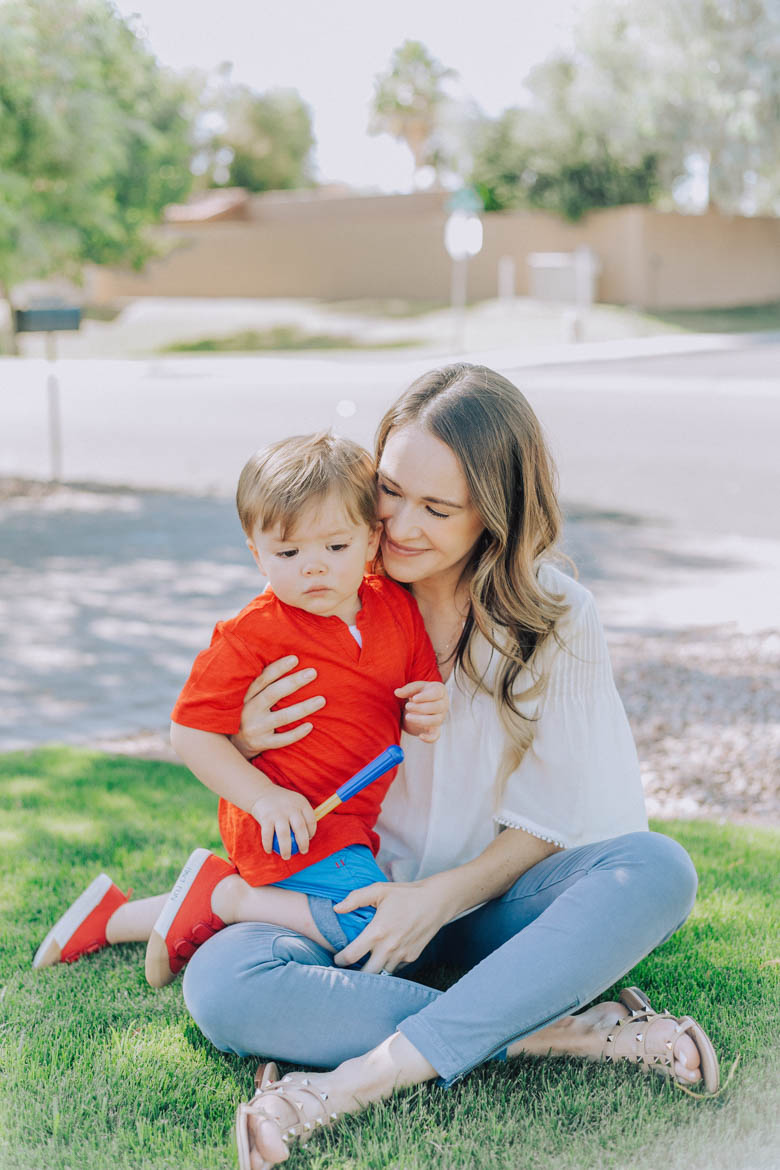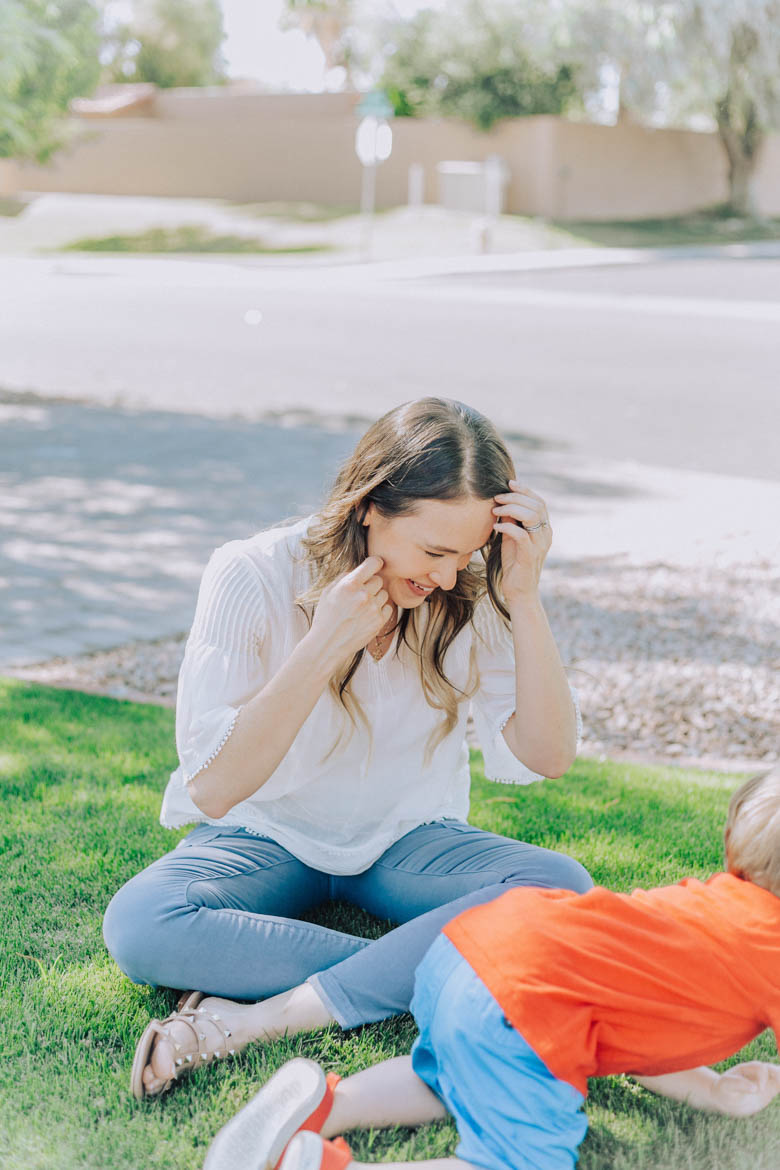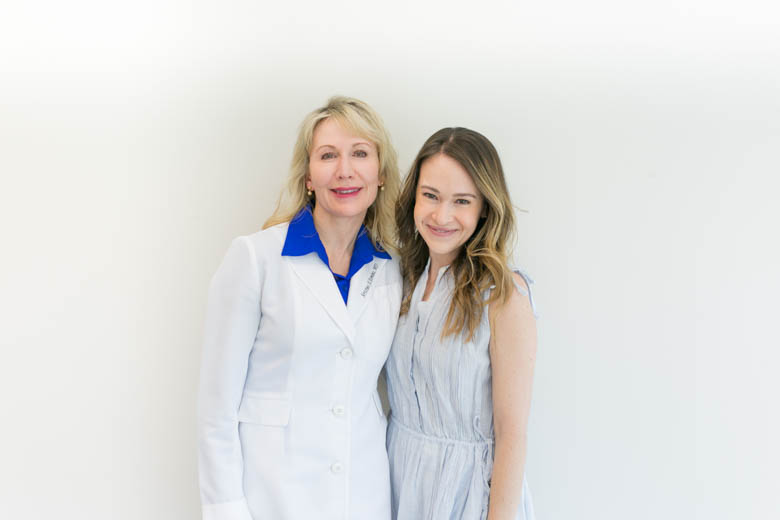
Becoming a parent changes EVERYTHING. It gets really hard sometimes, constantly striving to be this unrealistic “perfect parent”. And while there is no right way to parent, practicing mindfulness in our actions and reactions can allow us to step back from any situation and remind ourselves of the bigger picture instead of letting our emotions create temporary solutions.
But what does it even mean to practice mindful parenting? Hint: no, it doesn’t mean you have to meditate during every tantrum.
Dr. Shauna Shapiro is a professor, author, and award-winning international mindfulness expert. Her books, ‘The Art and Science of Mindfulness“, and “Mindful Discipline: a loving approach to setting limits & raising an emotionally intelligent child” are two of my favorite expecting mother books. She is talking on September 29th, 2018 at the AZ Mindful Moms’ Messy Motherhood event that I’ll be attending with Majka. So I thought, why not ask her to share more about her research on the blog!
How did you get started working in mindfulness?
When I was 17 I had spinal fusion surgery where a metal rod was put in my spine. I went from a healthy, active teenager, and captain of my volleyball team to lying in a hospital bed unable to walk. Not being able to walk was very challenging time and it changed my lifestyle. Laying in a bed all day gave me time to explore my thoughts and read. My dad gave me a John Kabat-Zin book that said “where you go, there you are” and that sentence stuck with me and defined how I would handle my new situation.
As my interest grew, I traveled to Thailand and Nepal to study mindfulness and it opened up healing an entire world of healing possibilities for me. I had significant experiences in the monasteries, that let to my decision to study mindfulness throughout my career. When I came back to U.S. to study, I began my PHD in political psychology and that 20 years ago was the beginning of it all.
What is exactly is “mindfulness“?
Mindfulness is really about acting and thinking with awareness. It can be broken down into 3 parts:
- Intention (why you’re paying attention)
- Attention (how you’re being present)
- Attitude (how you pay attention with kindness & curiosity)
It’s often called a practice because it’s something that has to be acted upon in real life situations. It’s not always our innate response and something we have to conscientiously condition our brain to do. It is stepping out of that auto pilot mode and choosing our thoughts and actions.
How does mindfulness affect someone?
Actually, a lot of my work has been in scientific research. I’ve conducted a number of studies that have shown real benefits of mindfulness. It …
- Reduces cortisol and stress
- Improves immune functioning
- Helps us sleep better
- Reduces anxiety, depression and panic attacks
- Increases memory, learning and academic performance
- Increases compassion and ethical decision making
- Decreases cultural bias and prejudice
- Increases milk flow during breastfeeding
Across the board there are significant proven benefits of mindfulness.
From my own experience, I had quite a difficult marriage and I went through hard time with stress and it caused my milk to dry up when I was breastfeeding my son. I wanted to keep nursing and so did my son. But I couldn’t nurse unless I meditated because I was relaxed.
Mindfulness is not a cure all and it’s not for everyone, but has great benefits.
How can mindful parenting change your relationship with your child?
When you become a parent, it’s such an unbelievable shift in your world. One that you can prepare for but, there’s no possible way to fully comprehend until you’re actually a parent. For me, I had an idea that because I was a mediator, psychotherapist, and a professor, that I would be able to use all the things I’ve learned and put them to practice perfectly. Well, that’s of course not true as I know now.
But mindfulness has allowed me to let go of my expectations, and embrace the mystery of parenting. I found out I desperately needed compassion for the unexpected.
The attitude of mindfulness is about kindness. Kindness to your child and to yourself. There will be times you mess up and that’s the time you need the most compassion for yourself.
For me I have learned when he is acting out, or at his most difficult, is when he most needs my love the most. When your child is acting out, they are in pain. Hold them with compassion, it changes everything and it begins with yourself. All of us want to be perfect parents; none of us want to harm our child. When we are impatient or snap or yell, I encourage you to bring it back to yourself.
As a working mom, it’s easy to shame yourself for taking energy away from your family. But when you shame yourself, your brain’s learning center shuts down. So if you want to see change, judging and shaming yourself won’t help you
What is mindful disciplining?
It is discipline with love. Setting boundaries and coming from a place of love. I struggled with this with my son because my husband was always the disciplinary parent. But when I got divorced, I stayed in my sweet mom role and my 5-year-old was running the house. My co-author Dr. Chris White saw me struggle and helped me learn that a “loving hierarchy” exists and I can discipline without losing my son’s love. Children need a parent, not just a friend.
They need that structure; They need to be kept safe. Sometimes I need to make important decisions (like bedtime or that unhealthy dinner choice) and not everything is up for discussion. Us creating that boundary and protection gives them the time they need to play and not think about the decisions that we need to make as parents.
How can we be more present in our time with our children?
One of the greatest harms is how frazzled and chaotic we are, because of technology. In my house, we have no technology. Put it away; don’t even want to see it. Even if the phone is turned over, but is being seen, it creates a less enjoyable experience. While that isn’t how everyone does things, creating that time that is technology free is so important.
When children see cell phones they think “that phone could take mom away from me”. Over and over again setting an intention and reminding myself of my priorities has been the easiest way to separate from my phone and be present.
In my daily working memory I remind myself that my son, Jackson, is the most important thing; be present with him. Time is precious, he is the most important thing. Jackson is my priority.
Other things in the moment may seem more important whether it’s work deadlines, our daily to-do’s, or that constantly buzzing cell phone. But sometimes our children aren’t always as noisy as are other demands so we give our attention elsewhere. It’s so easy to set Jackson up with an iPad so I can squeeze in an extra 3 hours of work, but I have to remember what the true goal is. So if that means I get less work done, or have to get up earlier the next morning then so be it.
What are your daily mindfulness practices anyone can do?
Every morning, I…
- Put my hand on my heart, which releases oxytocin (the love hormone), and I say “Good morning I love you Shauna”, giving myself my own kind attention and presence.
- Then I say “Good morning I love you Jackson” to wherever he is. It connects me with him in this really beautiful presence.
- I set an intention for the day, recently in the form of the question.” I wonder what surprising and the magical thing will happen today”. This keeps my mind open looking for the good instead of the bad.
- I start every day with that, then meditate or practice yoga.
Take this as a foundation or building block for that start of your mindful living if you’d like and customize to your priorities. If you give just one minute each morning to connect with yourself and set an intention, the benefits can be shocking.
How can we teach our children to be mindful?
My philosophy is the most important thing is for the parent to practice, is how we teach we are children through modeling. That’s how evolutionarily, children learn.
I do believe teaching them mindfulness practices, but the focus of my research and teaching is on parents and how we shift ourselves. However, we can help children to start understanding the importance of pausing before we react. Understanding self-regulation, regulating emotions and control impulses. Learning to be kind to ourselves and not so harsh or judgmental. We can teach that to our children at a young age and really set the trajectory of their life in a much different course, as long as however, we are showing them through example every day.
Do we have to meditate to be mindful?
NO! Mindfulness is an inherent part of being human. Everyone is mindful. We all have it. Mindfulness is just about being present, being aware and being conscientious. Meditation is the exercise that strengthens mindfulness. Just like the gym strengthens muscles, awareness is strengthened with meditation because you are taking time to cut out distractions and be with your thoughts.
The neuro-plasticity of our brains are shaped by repeated experiences. What you practice grows stronger, if you practice being kind, your kindness gets stronger. Practicing brings benefits. Mindfulness is not necessarily about meditation, but meditation is a wonderful mindful task. What I want parents to know, is you can be mindful everyday with using the 3 segments: intentionally paying attention with a kind, curious attitude.
Intention, Attention, and Attitude.


